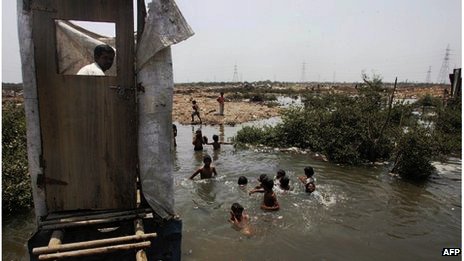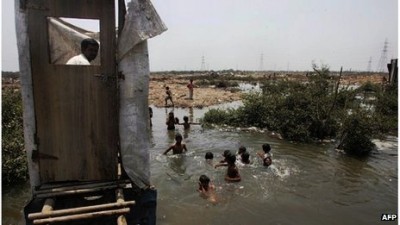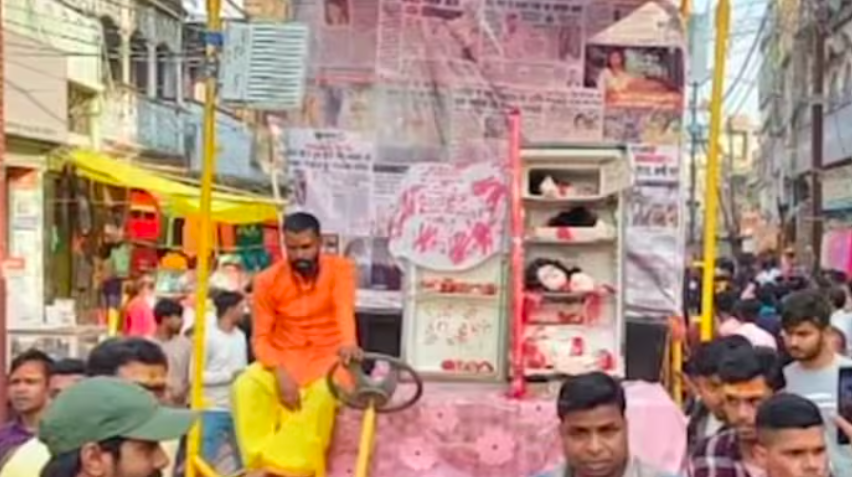Soutik Biswas
Is anybody really surprised that nearly half of India’s 1.2 billion people have no toilet at home?
Not really. The India Human Development report has been saying this for a while. The situation is worse in the villages, where two-thirds of the homes don’t have toilets. Open defecation is rife, and remains a major impediment in achieving millennium development goals which include reducing by half the proportion of people without access to basic sanitation by 2015.
Is the lack of toilets and preference for open defecation a cultural issue in a society where the habit actually perpetuates social oppression, as proved by the reduced but continued existence of low caste human scavengers and sweepers?
It would seem so.
Mahatma Gandhi, India’s greatest leader, had, in the words of a biographer, a “Tolstoyian preoccupation with sanitation and cleaning of toilets”. Once he inspected toilets in the city of Rajkot in Gujarat. He reported that they were “dark and stinking and reeking with filth and worms” in the homes of the wealthy and in a Hindu temple. The homes of the untouchables simply had no toilets. “Latrines are for you big people,” an untouchable told Gandhi.
Many years later when Gandhi began encouraging his disciples to work as sanitation officers and scavengers in villages, his diligent secretary and diarist Madhav Desai noted the attitudes of villagers. “They don’t have any feeling at all,” he wrote. “It will not be surprising if within a few days they start believing that we are their scavengers.”
India’s enduring shame is clearly rooted in cultural attitudes. More than half a century after Independence, many Indians continue to relieve themselves in the open and litter unhesitatingly, but keep their homes spotlessly clean. Yes, the state has failed to extend sanitation facilities, but people must also take the blame.
In the upstart suburb of Gurgaon, where I live, my educated, upwardly mobile, rich neighbours sent their pet dogs outside with their servants to defecate and refuse to clean up the mess. As long as their condominium is clean, it is all right. These are the same people who believe that the government is at the root of all evil.
Campaigns
Things are getting better in the villages, however slowly. Only 40% had access to sanitation facilities in 2002. This increased to 51% in 2008-009. More than 60% of homes in Bihar, Jharkhand, Madhya Pradesh, Orissa, Rajasthan, Tamil Nadu and Uttarakhand states were still without toilets. There are other interesting behavioural and cultural pointers: Sikh and Christian households had the highest – over 70% – access to improved sanitation. Hindus – at 45% – had the least access.
India provides subsidies to construct toilets and runs sanitation and hygiene campaigns. Federal spending on sanitation was increased nearly three-fold in 2005. In 2003, the government kicked off a scheme to award village councils which are able to eliminate open defecation. Kerala has been the best performer with 87% of its village councils picking up the award. Only 2% of councils in dirt-poor Bihar won in a dismal commentary on the state of its sanitation.
India could take the lead from the tiny states of Himachal Pradesh and Haryana. Both have used and empowered local people to tackle open defecation, build toilets and adopt good waste management. Haryana provides subsidies to poor households to build toilets, and enlists women to run campaigns in what is a largely patriarchal and less progressive state. Volunteers visit homes, encouraging people to built toilets. All homes in Himachal Pradesh have a toilet today, say government surveys. The plan is to get rid of open defecation by the end of this year.
But until the time its people get rid of curious – and skewed – cultural attitudes to community sanitation and hygiene, India will never have enough toilets.
(This article was first published in BBC)










